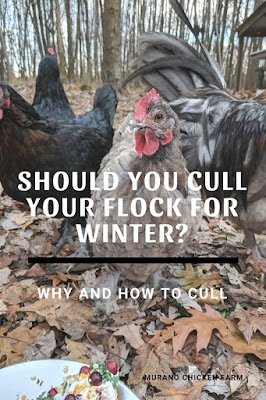This makes a lot of sense if your main reason for having chickens is to get farm fresh eggs.
However, not everyone runs their flock like a farmer. Many chicken keepers are perfectly happy letting their flock live out it's natural life.
I have one chicken that's 9 & 1/2 years old, so I can certainly understand that sentiment!
Chickens can live pretty long though, so if you don't intend to let them live out their natural lives, culling before winter may be a good idea for you.
What is culling?
To cull the flock means to reduce its population selectively, removing animals by choice. Remove does not always mean butcher or kill, but it can.Many people cull their flock by selling off chickens they decide they no longer need.
I have posts about poultry swaps, poultry auctions and my ridiculously honest craigslist ads as these are all ways I have used to cull my flock.
Should you cull the flock for winter?
There are several reasons why people cull their flocks.
Drop in egg production: hens over 2 years old don't lay as well as younger hens. During the winter, many hens stop laying completely.
Feed intake goes up in winter since free range chickens can no longer find bugs and weeds to eat. The cost of feed intake is higher than the eventual egg production of older hens.
Culling before the greenery dies off and the bugs go away for winter keeps feed costs low when egg production is lower.
Roosters: spring chicks that ended up being roosters are often culled in fall. Standard breeds should be large enough to butcher for meat at this point and excess roosters can fight and cause problems in the flock if not thinned out in some manner.
Genetics: If you are breeding your flock you'll want to cull any chickens that don't fit into the goals of your breeding plan. Spring chicks should be grown out enough to evaluate by fall or early winter.
Peace and harmony: If you have a problem child in the group, fall is the perfect time to get rid of him or her. Why feed them for the next few months if they are on their way out anyway?
In Rehoming a rooster: the how and why I talk about reasons for rehoming and how to get the job done so it works out best for you and the new home.
Meat: extra roosters and low producing hens can be 'sent to freezer camp' to provide meat for the family.
Free range chickens are about $10-15 at the butcher so processing them for meat saves me money and I don't have to feed them over winter.
Feed costs: I have mentioned this already, but it deserves it's own category because sometimes you just can't feed things that aren't giving you a good return on your investment.
I refer to this as my "no freeloaders policy". It simply means that each member of my flock must contribute more than they cost.
When hens are barely laying any eggs and eating their weight in feed, it's probably time to cull.
That being said...Yes, I have an old pet chicken (Sally) who does not contribute much in the way of eggs, but I think the husband would cull me if I got rid of her! lol
I do think there's a big difference in keeping one or two older hens and allowing the entire flock to age out of egg production.
Exceptions:
If you don't mind feeding your flock into old age & feed cost is not an issue.
If you're not working on a breeding program.
If the flock has no drama within it
In these cases culling for winter is absolutely not necessary for your flock!
If you do decide to cull your flock for meat, I have a tutorial on the easiest way to cull a chicken and the Prairie Homestead has a great tutorial on butchering chickens.
As a final note, I do often sell off older hens from my breeding program when I decide to cull the flock.
I am a huge believer in being brutally honest when selling a chicken. I will tell you every problem, flaw and asset of each chicken and ask a fair price.
I owe it to the chicken and the buyer to be honest about the whole transaction. Besides, I don't want to be 'that guy' that passes my problems on to someone else.
Plus, there are lots of reasons why someone else might want a hen that's past her prime or need a rooster and finding them a new home is really not that hard.
~L
Want information on raising chickens sent right to your email weekly? Click right here to join my list and get new posts sent directly to you the day they're published ... plus, you'll also get the free download '25 Ways to save money raising chickens'.




No comments:
Post a Comment